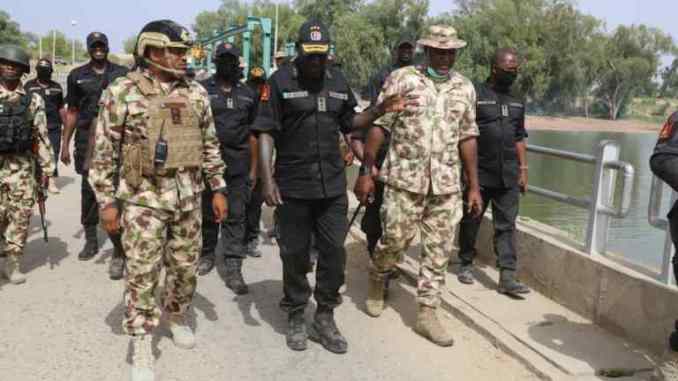The Centre for Africa Liberation and Socio-Economic Rights (CALSER) has rubbished Amnesty International’s latest report against the Nigerian Military in the war against Boko Haram/ISWAP terrorists.
Amnesty had alleged that children in the North-East were being subjected to unlawful treatment and detention in inhumane conditions.
However, in a counter-report signed by Princess Ajibola, on Wednesday, CALSER described the claims as “ fallacy, lacking in objectivity”.
The Centre said this may just be another coy by the international humanitarian organization in its characteristics penchant for distracting the Nigerian troops when the morale is high.
CALSER added that this is even more striking, especially as the report was based on an interview conducted on only 48 children held in detention, as well as 22 adults.
Contrary to AI’s allegation, the Centre disclosed that the military have been conducting operations that led to the rescue of thousands of women and children, granting them access to medical care before release to their families.
CALSER noted that in all of its engagements, “we have not been able to establish cases of torture by the Nigerian Military as put forward by Amnesty International”.
The Centre for Africa Liberation and Socio-Economic Liberation, therefore, stated that the recent report by AI is lacking in all ramifications and should be disregarded by all and sundry.
It, however, pledged its commitment to continue working with the military in the war against terrorism in Nigeria.
Read the full report below:
The Centre for Africa Liberation and Socio-Economic Rights Statement on Amnesty International’s report “‘We dried our tears’: Addressing the toll on children of Northeast Nigeria’s conflict” accusing the Nigerian Military subjecting children in North-East Nigeria to unlawful treatment and detention.
The Nigerian Military has been engaged in the prosecution of the war against terrorism in North-East Nigeria since 2009 when the Boko Haram terrorist group began a violent campaign against Nigeria.
As standard with warfare, there are bound to be casualties of immeasurable proportion. But the report by Amnesty International in fulfilment of its supposed mandate of bringing to the fore perceived cases of human rights violations in countries where it operates, Nigeria inclusive is lopsided.
In the report by Amnesty International, it alluded that the Nigerian Military’s treatment of those who escape such brutality has also been appalling. From mass, unlawful detention in inhumane conditions, to meting out beatings and torture and allowing sexual abuse by adult inmates – it defies belief that children anywhere would be so grievously harmed by the very authorities charged with their protection.
This statement is at best a fallacy that lacks objectivity as the activities of the Nigerian Military in North-East Nigeria has continuously been scrutinized by a coalition of civil society organizations including the Centre for Africa Liberation and Socio-Economic Rights.
The Centre for Africa Liberation and Socio-Economic Rights believes that the motives of Amnesty International in this regard could be hinged on a disdain for the successes recorded since 2016 when the Nigerian Military gained ascendency over the Boko Haram terrorist group.
This is on the heels that the report was based on an interview conducted on 48 children held in detention, as well as 22 adults. It is indeed questionable that conclusions can be drawn from such sample size given the population of North-East Nigeria that as at 2011 stands at 23,558,674 or 13.5% of the country’s population.
It must be stated that such a sample size cannot avail a reasonable conclusion in research. As such, there is a high level of mischief on the part of Amnesty International, which might not be unconnected with its insatiable desire to see to the festering of the crisis in North-East Nigeria to suit their purpose and cause a distraction to the operations of the Nigerian Military.
The Centre for Africa Liberation and Socio-Economic Rights have in times past questioned the genuineness of the reports of Amnesty International on Nigeria. This position of ours had led to the commissioning of various researches to ascertain the veracity of the claims made by Amnesty International.
It suffices to state that on these occasions, there was a wide disparity between what was reported by Amnesty and our team of independent researchers. This has been the trend, and it has assumed a worrisome dimension with the recent report by Amnesty International.
Amnesty International in its report also posited that most of such detentions were unlawful; children were never charged or prosecuted for any crime and are denied the rights to access a lawyer, appear before a judge, or communicate with their families. The widespread unlawful detentions may amount to a crime against humanity.
It is common knowledge that the use of children in war is a crime against humanity. And as such, it is indeed bewildering that Amnesty International can feign ignorance to these ignoble acts by Boko Haram. While it is understandable that Amnesty International would feign this ignorance, it is nonetheless against all known protocols why such anomalies should be encouraged rather than rebuked.
The Centre for Africa Liberation and Socio-Economic Rights is in receipt of the fact that the Nigerian Military has been conducting rescue operations that have led to the rescue of thousands of women and children have been rescued from the Boko Haram captivity. It is also public knowledge that the Nigerian Military has availed those rescued from captivity access to medical care, as well as counselling before they are released back to their families.
Therefore, there is no record in the archives of the Centre for Africa Liberation and Socio-Economic Rights that indicates otherwise. We have also been painstaking in scrutinizing cases of human rights violations in North-East Nigeria and the bulk of the summary of our scrutiny highlighted gross violations by the Boko Haram group. Case studies were seen in the Chibok girls, the Dapchi girls, as well as the Buni Yadi massacre of young boys in their dormitory by the Boko Haram group.
It must be stated that children rescued from Boko Haram captivity are not detained or charge for terrorism as in the first instance, the involvement of children was more forceful and against their wishes. This fact, the Nigerian Military highlighted and stated that counselling sessions are availed rescued captives regardless of their age or gender.
Amnesty International was economical with the truth when it stated in the report that almost everyone fleeing Boko Haram territory, including children, is “screened” by the Military and Civilian Joint Task Force – a process that, for many, involves torture until the person “confesses” to affiliation with Boko Haram. Alleged Boko Haram members and supporters are transferred and held, often for months or years, in squalid conditions in detention centres including Giwa Barracks in Maiduguri and the Kanji military base in Niger State.
Every discerning mind would agree that screening is a precautionary measure put in place by the Nigerian Military to ensure that fleeing Boko Haram terrorist do not infiltrate the civilian populace and wreak further havoc. The Centre for Africa Liberation and Socio-Economic Rights observed that these precautionary measures have indeed drastically reduced incidences of suicide bombings in markets, places of worship, communities and other places in times past.
Moreover, in all of our engagements, we have not been able to establish cases of torture by the Nigerian Military as put forward by Amnesty International. We are indeed aware that the Nigerian Military has a Directorate for Civil-Military relations, as well as the establishment of human rights desks.
It is worthy to state that the establishments of these initiatives have seen to the reprimanding and consequent prosecution of errant soldiers that were caught violating human rights in North-East Nigeria.
It is therefore awkward that Amnesty International estimates that at least 10,000 people, including many children, have died in detention during the conflict. There is no iota of truth in this claim, and this much Amnesty International must own up to.
Amnesty International contradicted itself in its report wherein it stated that conditions are better at the Operation Safe Corridor site than elsewhere in military detention, and former detainees spoke positively about the psychosocial support and adult education there.
For inexplicable reasons, Amnesty International refused to acknowledge the fact that the detention facilities of the Nigerian Military operate under the same conditions. This much the Centre for Africa Liberation and Socio-Economic Rights can attest to given the fact that it has on several occasions, visited the various detention centers of the Nigerian Military in various locations.
The Centre for Africa Liberation wishes to advise Amnesty International to dedicate substantial time to conducting field research instead of relying on hearsays and desk research with regards to the operations of the Nigerian Military in North-East Nigeria.
Conclusion:
The Centre for Africa Liberation and Socio-Economic Liberation states in unequivocal terms that the recent report by Amnesty International is lacking in all ramifications and should be disregarded by all and sundry.
The accusations are with sinister motives and not a reflection of the issues on the ground. The general public must realize that acts of terrorism are of various dimensions and Amnesty International through its recently released report has availed us the possibility of intellectual terrorism.
The Centre for Africa Liberation would continue to work with the Nigerian Military in the war against terrorism in Nigeria.

